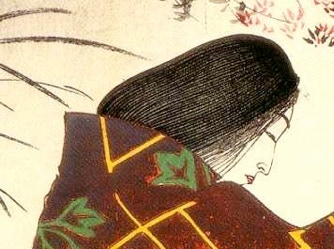Izumi Shikibu

Izumi Shikibu was a renowned poet contemporary of Murasaki Shikibu. They were not related. The Shikibu in their names comes from the fact that their fathers at one time held posts in the Bureau of Ceremonial (shikibu-shō). Both women were members of the lower echelons of the nobility.
There is no record of the two Shikibus having met, even though Izumi was invited to join Empress Shōshi's salon in 1009, three years after Murasaki. In that small world it is hard to imagine they would not have run across one another frequently. Murasaki's rather stinging opinions of Izumi come directly from her Diary, in a letter fragment containing unsweetened characterizations of various ladies of her acquaintance. In order to account for Murasaki's disdain, I built in a scene depicting Izumi as slow to pick up a poetic reference. This is entirely made up and I have been quite unfair to Izumi Shikibu in this one-sided portrayal. There is no record of what she thought about Murasaki.
I continued to build on this nugget of ill will in the fictional scene where Murasaki feels betrayed when her friend Sanenari (real person, fictional relationship to Murasaki) ignores her and begins to court Izumi Shikibu in her stead. When Murasaki was younger I proposed that her feelings about Izumi were more sanguine. I have Murasaki admiring Izumi's most famous poem "Out of darkness" which was in fact included in the Collection of Gleanings anthology compiled by Retired Emperor Kazan and his minister Kintō in 1005. Izumi was probably no more than seventeen when she composed that poem. I think I have characterized the Collection of Gleanings fairly—a rather pale reflection of the earlier classic anthology the Kokinshū, and indeed, within its selections, Izumi's poem does stand out.
The scene where Izumi is glimpsed riding in the back of Prince Atsumichi's carriage at the parade during the Kamo Festival is true to history. The incident occurred in the early summer of 1005 and scandalized society. Izumi had been involved with Atsumichi's brother, Prince Tametaka, who had died of the plague the previous year. Izumi Shikibu's Diary, a work of short sections of prose jeweled with more than 140 waka, is a record of her affair with Atsumichi. The prince even installed Izumi in a wing of his own mansion, prompting his principal wife to stomp off to her sister's house in a fit of injured pride. No one knows what became of Izumi Shikibu after she joined Empress Shōshi's salon. Her tombstone can be found today in a section of the graveyard of the Shinnenji temple in Kyoto, tucked behind the trendy arcaded shops of Teramachi. I stumbled upon it by accident when I went to that temple to visit the grave of Ichiume, my geisha sister who died in a fire in 1977.